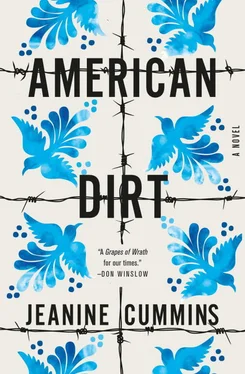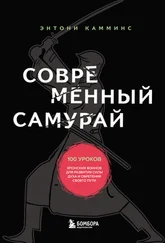Жанин Камминс - American Dirt
Здесь есть возможность читать онлайн «Жанин Камминс - American Dirt» весь текст электронной книги совершенно бесплатно (целиком полную версию без сокращений). В некоторых случаях можно слушать аудио, скачать через торрент в формате fb2 и присутствует краткое содержание. Город: London, Год выпуска: 2020, ISBN: 2020, Издательство: Tinder Press, Жанр: Современная проза, на английском языке. Описание произведения, (предисловие) а так же отзывы посетителей доступны на портале библиотеки ЛибКат.
- Название:American Dirt
- Автор:
- Издательство:Tinder Press
- Жанр:
- Год:2020
- Город:London
- ISBN:978-1-4722-6138-0
- Рейтинг книги:5 / 5. Голосов: 1
-
Избранное:Добавить в избранное
- Отзывы:
-
Ваша оценка:
- 100
- 1
- 2
- 3
- 4
- 5
American Dirt: краткое содержание, описание и аннотация
Предлагаем к чтению аннотацию, описание, краткое содержание или предисловие (зависит от того, что написал сам автор книги «American Dirt»). Если вы не нашли необходимую информацию о книге — напишите в комментариях, мы постараемся отыскать её.
FEAR KEEPS THEM RUNNING.
HOPE KEEPS THEM ALIVE.
Vivid, visceral, utterly compelling, AMERICAN DIRT is the first novel to explore the experience of attempting to illegally cross the US-Mexico border. cite empty-line
9
empty-line
11 empty-line
14
American Dirt — читать онлайн бесплатно полную книгу (весь текст) целиком
Ниже представлен текст книги, разбитый по страницам. Система сохранения места последней прочитанной страницы, позволяет с удобством читать онлайн бесплатно книгу «American Dirt», без необходимости каждый раз заново искать на чём Вы остановились. Поставьте закладку, и сможете в любой момент перейти на страницу, на которой закончили чтение.
Интервал:
Закладка:
‘We made it,’ he says quietly.
Mami opens her lips without moving her teeth. She doesn’t look relieved. ‘Okay, mijo, ’ she says. She pulls his head onto her lap and strokes his hair until, as their bus rambles north onto the Viaducto Diamante and gathers speed, he falls asleep.
CHAPTER SEVEN
It’s a victory to get out of Acapulco alive, Lydia knows this. Yes, they’ve cleared the first significant hurdle. She’d like to feel her son’s surge of relieved optimism, but she knows too much about the reach and determination of Los Jardineros and their jefe to experience any real respite from her fear. She stares out the window and keeps her head low.
In the early days of their marriage, Lydia and Sebastián took frequent weekend trips to Mexico City, trading cities with the tourists. They’d both gone to college there. It was where they met, and though neither of them had any desire to live in the capital, they enjoyed being close enough to visit. In those days, the state of Guerrero felt safe, insulated. Their country had its share of narcotraficantes back then, but they felt as distant as Hollywood or Al Qaeda. The violence would erupt in concentrated, faraway bursts: first Ciudad Juárez, then Sinaloa, then Michoacán. Acapulco, ringed by mountains and sea, retained its sunny bubble of protective tourism. The salty ocean air, the wheeling calls of the seagulls, the big sunglasses, the wind whipping down the boulevard to toss the ladies’ hair around their sun-browned faces, it all intensified that swollen illusion of immunity.
It typically took Lydia and Sebastián just over four hours to drive from Acapulco to Mexico City in their orange Beetle because Sebastián sped like a lunatic around the gentle mountain curves, up and down the scenic slopes of the highway. Even though his driving was questionable, the road was broad and smooth. Lydia looked out over the landscape, at the sunshine leaning between the distant peaks, the terraces of clouds stepping down toward the irregular earth, the rooftops and steeples of the fleeting villages, and she felt safe with her new husband in their little orange car. At Chilpancingo they often stopped for a coffee or a sandwich. Sometimes they met with friends – Sebastián’s college roommate lived there with his wife and the baby who became Sebastián’s godson. And then a couple hours later, in Mexico City, they’d find a cheap hotel and walk the city for hours. Museums, shows, restaurants, dancing, window-shopping, the Bosque de Chapultepec. Or sometimes they wouldn’t leave their hotel room at all, and Sebastián, sweaty, laughing, tangled in the sheets, would whisper into his wife’s hair that they could have stayed in Acapulco and saved some money.
Lydia tips her head back against the bus seat behind her. It’s inconceivable that those memories are from ten years ago, inconceivable that Sebastián is really gone. She feels a monstrous lurch inside her, so she reaches out to touch the soft curve of Luca’s sleeping ear. Everything devolved so rapidly in recent years. Acapulco always had a heart for extravagance, so when at last she made her fall from grace, she did so with all the spectacular pageantry the world had come to expect of her. The cartels painted the town red.
As their bus passes the crooked shoulders of trees and a scar of blasted rock face where the road cuts through the countryside, Lydia notes that they’ve already reached Ocotito. She prays there will be no roadblock between here and Mexico City, but she knows that’s impossible. Even before Acapulco fell, the roadblocks around Guerrero, as in much of the country, had become a menace. They are manned by gangs or narcotraficantes or police (who may also be narcotraficantes ) or soldiers (who may also be narcotraficantes ) or, in recent years, by autodefensas – armed militias formed by the inhabitants of certain towns to protect their communities from cartels. And these autodefensas may also, of course, be narcotraficantes .
In character, the roadblocks range from inconvenient to life threatening. It’s because of the existence of the more serious ones that Lydia and Sebastián stopped traveling regularly to the capital shortly after Luca was born, the reason Luca has been to Mexico City only once before, when he was too young to remember it, and the reason Lydia allowed her driver’s license to expire almost two years ago. They seldom left Acapulco now, and Lydia, like most women in Mexico’s more precarious states, never travels alone by car anymore. This truth has felt like a growing, but theoretical, irritation to Lydia over the last couple of years, an affront to her contemporary feminine autonomy. But today it feels like a very real noose around her neck. She may have managed their escape from Acapulco for now, but she knows they’re still trapped in Guerrero state, and she can feel the roadblocks all around the periphery of her mind, closing in on them.
Without waking Luca, Lydia spreads out the map and pins it with one hand to the seat in front of her. She studies the spreading veins of the roadways and feels the ticking futility of that action. If only their bodies could pass unimpeded along these highways as quickly and safely as her finger traces the route along the map. If the roadblocks were represented on the map key, their icon might be a tiny AK-47. But they’re not on the map, because they’re always moving, to maintain the element of surprise. Lydia knows that every road between here and Mexico City will have at least one roadblock occupied by Los Jardineros. She knows that the boys manning those roadblocks will be looking specifically for her and for Luca. She imagines that some of those boys are both ambitious and violent, that they’ll be eager to recognize her. She wonders what reward they might receive for delivering her, either whole or in pieces, to her friend.
Lydia tries to refold the map along its previous creases, but her patience is flimsy, and she shoves it into the pocket of the seat in front of her. She tries to think clearly, to review their options. Most people she would ordinarily turn to for help are dead, and even if they weren’t, asking for help is akin to walking into a friend’s kitchen wearing a suicide vest. The risk of her very presence seems too selfish to consider. Although she’s aware that Chilpancingo is crawling with Jardineros, she also knows that if they hope to avoid a roadblock, they will have to get off there. Boarding this bus felt like a tremendous victory only a few minutes ago, but maybe it was a mistake. Maybe they’re speeding into a trap. She watches Luca, the rise and fall of his chest as he sleeps, and she attempts to match the rhythm of his breath.
When she was a kid, Lydia loved the Choose Your Own Adventure books. At the end of each chapter, you’d have to decide what to do next. Ride your bike to the park, flip to page twenty-three. Follow the mysterious stranger, flip to page forty-two. Whenever Lydia didn’t like the outcome of her plot, or sometimes even when she did, she would backtrack and make a different choice. She liked being able to revise her own decisions, liked knowing that nothing was permanent, that she could always start over and try again. But it was also true that sometimes it didn’t matter, the maze of the book seemed to funnel her back to the same result, no matter what she decided. This morning she and Luca had selected the 6:20 a.m. bus from Diamante, and now it’s traveling north without delay. She closes her eyes and prays it was the right choice.
Luca wakes up as the bus approaches Chilpancingo. Lydia can’t see much from their seats halfway back, but she tries. She leans into the aisle and looks for a roadblock ahead. Luca leans his forehead against the window, and presses his finger against the smudgy glass.
Читать дальшеИнтервал:
Закладка:
Похожие книги на «American Dirt»
Представляем Вашему вниманию похожие книги на «American Dirt» списком для выбора. Мы отобрали схожую по названию и смыслу литературу в надежде предоставить читателям больше вариантов отыскать новые, интересные, ещё непрочитанные произведения.
Обсуждение, отзывы о книге «American Dirt» и просто собственные мнения читателей. Оставьте ваши комментарии, напишите, что Вы думаете о произведении, его смысле или главных героях. Укажите что конкретно понравилось, а что нет, и почему Вы так считаете.












